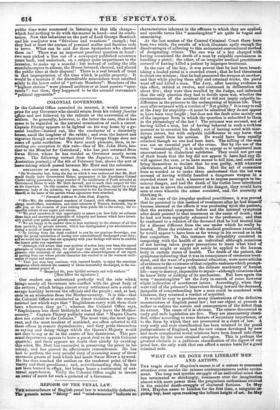COLONIAL GOVERNORS.
the Colonial Office consulted its interest, it would invent a prize for any Governor who should return from his colonyfunctus qfficio and not followed by the ridicule or the execration of the settlers. So generally, however, is the latter the case, that it has come to be regarded as the natural termination of such a career. Captain Fitzroy appears to be lighted on his way home by a ge- neral bonfire—burned out, like the conductor of a disorderly house, amid the laughter of the rabble ; and even the honest and vigorous though somewhat theatrical Sir George Gipps does not come off quite scatheless. We have much pleasure, then, in re- cording one exception to this rule—that of Mr. John Hutt, bro- ther to the Member for Gateshead ; who has just returned from Swan River, where he has resided as Governor nearly seven years. The following extract from the Inquirer, (a Western Australian journal,) of the 4th of February last, shows the sort of leave-taking which passed between Mr. ftutt and the colonists.
DEPARTURE OF JOHN HUTT, ESQ., FROM GOVERNMENT HOUSE.
"On Wednesday last, being the day on which it was understood that Mr. Hutt would finally leave Government House, preparatory to his Excellency Colonel Clarke taking possession, a large number of the inhabitants of Perth attended at Government House to wish Mr. Hntt farewell, and to mark their respect for him an his departure. On this occasion also, the following address, signed by a very anmerous body of the colonists, was presented to the Ex-Governor by the High -Sheriff, in the name of the parties whose signatures were attached.
"' Farewell Address to John Hutt, Esquire.
"'Fir—We, the undersigned members of Council, civil officers, magistrates clergy, landholdera, merchants, and other colonists of Western Australia, beg to offer you, on the occasion of your retiring from public life iu the colony, the re- spectful tribute of our regret and esteem. We avail ourselves of this opportunity to assure you how fully we estimate those high and unswerving principles of integrity and honour which have invari- ably guided your public and private conduct. " We are happy to be enabled thus to bear testimony to the absence of all bias from partiality or private interest, which has distinguished your administration during a period of nearly seven years.
In retiring from the trust confided to you by our gracious Sovereign, you enjoy the proud satisfaction of having ever conscientiously discharged your duty; and we would fain hope that our sympathy with your feelings will serve to confirm the honest pride you experience. ''Although well aware that your motives of action have ever been the sacred principles of religion and duty, we still hope that you will not receive without pleasure this testimony of our approbation—this acknowledgment of our regret at parting from one whose private character has excited in us the warmest senti- ments of regret and esteem. "'That you may long continue, with renewed health, to enjoy the conscious happiness which attends the memory of duties honourably discharged, is the sin- cere and earnest prayer of,
" Eapected Sir, your faithful servants and well-withers.'" (Here follow the signatures.]
Our readers can understand perfectly well the rule which imings nearly all Governors into conflict with the great body of the settlers; which brings almost every settlement into a state of savage hostility between the officials and the people ; and, at last, ends in an alienation from the Mother-country. It is this—that the Colonial Office is conducted in direct violation of the consti- tutional law which says that "Englishmen carry with them their laws wherever they go " • whereas the Colonial Office says, "Englishmen lose their birthright when they leave the Mother- country." Captain Fitzroy publicly stated that "Magna Charts does not extend to the Colonies." The most vain, the most igno- rant, and the most insolent of mankind, are often selected to fill these offices in remote dependencies ; and they, pride themselves on saying and doing things which the Queen s Majesty would not dare to say or do III the centre of her dominions. This per- sonal deportment appears to have a great deal to do with Colonial quarrels ; and there appears no doubt that chiefly by avoiding this error, Mr. Hutt has succeeded in preserving the peace in his colony, and has gained its affectionate remembrance. He has had to perform the very painful duty of resuming many of those enormous grants of land which had made Swan River a byword. Ile has thus touched the settlers on the tenderest point of their vanity and their greediness ; and, notwithstanding this, he has not been burned in effigy, but brings home a testimonial of uni- versal approbation. Verily the Colonial Office ought to invent an order of merit for such a godsend of a Governor.


























 Previous page
Previous page